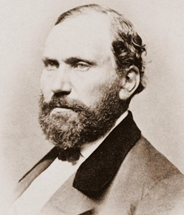Allan J. Pinkerton
1819-1884
A Scottish–American detective and spy, best known for creating the Pinkerton National Detective Agency, was born in Gorbals, Glasgow. He left school at the age of 10 after his father's death. Pinkerton read voraciously and was largely self-educated. A cooper by trade, Pinkerton was active in the Scottish Chartist movement as a young man. He secretly married Joan Carfrae (1822–1887) from Duddingston, then a singer, in Glasgow on 13 March 1842. Pinkerton emigrated to the United States in 1842. The novel plays with the idea that his ideas and tactics may have spread to a relation of his wife in Duddingston, or even originated there. In 1843 Pinkerton heard of Dundee Township, Illinois, fifty miles northwest of Chicago. As early as 1844, Pinkerton worked for the Chicago abolitionist leaders, and his Dundee home was a stop on the Underground Railroad. He first became interested in criminal detective work while wandering through the wooded groves around Dundee, looking for trees to make barrel staves, when he came across a band of counterfeiters. After observing their movements for some time he informed the local sheriff, who arrested them. This later led to Pinkerton being appointed, in 1849, as the first police detective in Chicago, Cook County, Illinois. In 1850, he partnered with Chicago attorney Edward Rucker in forming the North-Western Police Agency, which later became Pinkerton & Co, and finally Pinkerton National Detective Agency. Pinkerton's business insignia was a wide-open eye with the caption "We never sleep." When the Civil War began, Pinkerton served as head of the Union Intelligence Service during the first two years, heading off an alleged assassination plot in Baltimore, Maryland while guarding Abraham Lincoln on his way to Washington, D.C. His agents often worked undercover as Confederate soldiers and sympathizers to gather military intelligence. Pinkerton himself served on several undercover missions as a Confederate soldier using the alias Major E.J. Allen. Following Pinkerton's service with the Union Army, he continued his pursuit of train robbers, including the Reno Gang. He also opposed labour unions. In 1872, the Spanish Government hired Pinkerton to help suppress a revolution in Cuba which intended to end slavery and give citizens the right to vote. If Pinkerton knew this, then it directly contradicts statements in his 1883 book The Spy of the Rebellion, where he professes to be an ardent abolitionist and hater of slavery. The Spanish government abolished slavery in 1880 and a Royal Decree abolished the last vestiges of it in 1886. Allan Pinkerton died in Chicago on July 1, 1884. It is usually said that Pinkerton slipped on the pavement and bit his tongue, resulting in gangrene. Contemporary reports give conflicting causes, such as that he succumbed to a stroke (which he had a year earlier) or to malaria, which he had contracted during a trip to the Southern United States. At the time of his death, he was working on a system to centralize all criminal identification records, a database now maintained by the Federal Bureau of Investigation.
